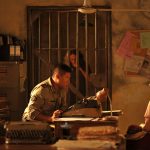While we associate Alfred Hitchcock, the genius behind ‘Psycho’, ‘Rear Window’ and ‘Dial M for Murder’, with the darker side of humanity, he’s the last person we would link to a documentary about the Holocaust. Hitchcock’s late involvement in the ‘German Concentration Camps Factual Survey’ is one of many revelations contained in Night Will Fall, a powerful film that should be shown to the widest possible audience.
André Singer, documentary producer extraordinaire (The Act of Killing, Into the Abyss) directs this compelling film about the British-led project to film the ‘liberation’ of the Nazi concentration camps for posterity: a testimony that was tragically thwarted by the rapid changes in the post-war political landscape.
In 1945, the Ministry of Information’s Sidney Bernstein (who went on to found Grenada Television) used British, but American and Russian soldiers/cameramen to provide ‘lasting, undeniable evidence’ of the Nazi crimes. The target audience was the German people who would never again seek shelter in their denial.
Bernstein commissioned the future cabinet minister Richard Crossman to write the script, and top editor Stewart McAllister to edit the material from a myriad of cameras. He also called his old friend Hitchcock, then at the height of his fame in America, to serve as Treatment Advisor. Hitch said that he wanted to make some contribution but was ‘too overage and overweight’ to be recruited in any other way.
Bernstein states: ‘my instructions were to prove what had happened. This would be the evidence we could show them [the German Holocaust deniers]. In front of the cameras, the SS personnel were forced to do the ‘unpleasant’ tasks of dragging skeletal bodies to mass graves, or burning them, tasks previously undertaken by the prisoners.
The cameras also captured civilians from the surrounding Weimar villages and towns who were forced to walk through the camps witnessing the horrors. Many became ill and fainted. Hitchcock recommended that the film incorporate maps that showed the close proximity between the camps and the civilians who claimed they had no knowledge of what was going on. It was recognised as a great idea.
Like many documentaries, Night Will Fall relies on talking heads, but seldom have commentaries been so fascinating and poignant. After 70 years, the emotions are still live, still raw enough to produce tears and all those who experienced the camps.
One interviewee is the famous cellist Anita Lasker-Wallfisch, who survived Auschwitz because of her musical talent and in late 1944 was taken to Bergen-Belsen ahead of the advancing Red Army. She was 19 when she saw the soldiers arriving. ‘We thought we were dreaming. We did not expect to still be alive, but we were.’
Another touching testimony is from Branko Lustig, who survived Auschwitz and Bergen Belsen and went on to co-produce the Academy Award winning films, Schindler’s List and Gladiator.
Along with showing us archival footage and footage from the original, aborted ‘Factual Survey’ the film explains the fate of the project, which is a tragic story in itself. As the cold war rapidly escalated in the 1950s, British and American interest began to realign with Germany rather than the Soviet Union.
It was felt that the film might be too sensitive an issue to resurrect as it would open healing wounds. Fortunately, the ‘Factual Survey’ has recently been completed by the Imperial War Museums after a long, and painstaking restoration project.
Joyce Glasser – MT film reviewer




